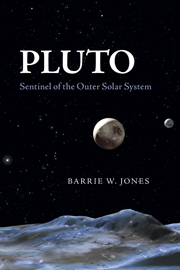Book contents
- Frontmatter
- Contents
- List of tables
- Preface
- Acknowledgements
- 1 The Solar System
- 2 The discovery of Uranus, Neptune and Pluto
- 3 Pluto: a diminishing world
- 4 Pluto's family
- 5 Surfaces, atmospheres and interiors of Pluto and Charon
- 6 The Edgeworth-Kuiper belt
- 7 Is Pluto a planet?
- 8 The New Horizons mission to Pluto (and beyond)
- 9 Pluto: gateway to beyond?
- Glossary
- Further reading and other resources
- Index
Preface
Published online by Cambridge University Press: 05 December 2011
- Frontmatter
- Contents
- List of tables
- Preface
- Acknowledgements
- 1 The Solar System
- 2 The discovery of Uranus, Neptune and Pluto
- 3 Pluto: a diminishing world
- 4 Pluto's family
- 5 Surfaces, atmospheres and interiors of Pluto and Charon
- 6 The Edgeworth-Kuiper belt
- 7 Is Pluto a planet?
- 8 The New Horizons mission to Pluto (and beyond)
- 9 Pluto: gateway to beyond?
- Glossary
- Further reading and other resources
- Index
Summary
Pluto is a very tiny, distant world. It orbits the Sun beyond the giant planet Neptune, the outermost of the other eight planets in the Solar System. In inward order from Neptune these planets are Uranus, Saturn, Jupiter, Mars, Earth, Venus and Mercury. Pluto has a diameter a little less than one fifth of the diameter of our planet, which itself is a long way from being the largest planet in the Solar System. That title belongs to the giant planet Jupiter, with a diameter just over 11 times that of the Earth.
Why should a book be devoted to such a tiddler among the planets? There are three main reasons. First, the discovery of Pluto in 1930 is a fascinating episode in our quest to discover whether the Solar System beyond Neptune is devoid of planetary bodies. Second, ever since its discovery, controversy has been rampant about what sort of body Pluto is. Is it deserving of the status of planet, or is it too small for that? The classification of Pluto is an excellent example of the role of classification in all branches of science: classification not only comes with great advantages but also with difficulties. Third, Pluto is the closest large member of the Edgeworth-Kuiper belt, a great swarm of small bodies that orbit the Sun beyond Neptune. Though the existence of such a belt had been predicted in the 1940s, it was not until the 1990s that discoveries of other trans-Neptunian bodies were made.
- Type
- Chapter
- Information
- PlutoSentinel of the Outer Solar System, pp. x - xiPublisher: Cambridge University PressPrint publication year: 2010

